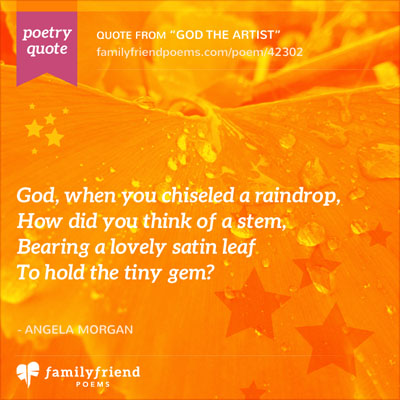41. The Eagle
Famous Poem
He clasps the crag with crooked hands;
Close to the sun in lonely lands,
Ringed with the azure world, he stands.
Famous Poem
He clasps the crag with crooked hands;
Close to the sun in lonely lands,
Ringed with the azure world, he stands.

This poem touched my heart as no other poem has. I love nature and most poems don't interest me. When I can, I am outside in nature and when I have to go inside, I fall just like the Eagle at...
Advertisement
Advertisement
Famous Poem
Winter is the king of showmen,
Turning tree stumps into snow men
And houses into birthday cakes
And spreading sugar over lakes.

Advertisement
Advertisement
Famous Poem
Snow falling and night falling fast, oh, fast
In a field I looked into going past,
And the ground almost covered smooth in snow,
But a few weeds and stubble showing last.

The time was 1958, the school Oak Park River Forest High, in a western suburb west of Chicago. The class was English Literature, and the teacher was Mildred Linden. After Christmas break, we...
Famous Poem
I come from haunts of coot and hern,
I make a sudden sally
And sparkle out among the fern,
To bicker down a valley.


I was read poetry to my mother born 1929 in faraway Colombo, Sri Lanka. She loved this poem, and I remember her animated voice bringing the words hidden in the babbling brook to life and the...
Famous Poem
I wandered lonely as a cloud
That floats on high o'er vales and hills,
When all at once I saw a crowd,
A host, of golden daffodils;

Honestly! How lovely is this poem when read aloud. I can see the yellow heads of the daffodils doing their sprightly dance! And, when in the meditative state, I can feel them in my heart...
Famous Poem
Nature's first green is gold,
Her hardest hue to hold.
Her early leaf's a flower;
But only so an hour.

Famous Poem
HERE in a quiet and dusty room they lie,
Faded as crumbled stone and shifting sand,
Forlorn as ashes, shrivelled, scentless, dry -
Meadows and gardens running through my hand.

Famous Poem
I caught a tremendous fish
and held him beside the boat
half out of water, with my hook
fast in a corner of his mouth.
Famous Poem
My Sorrow, when she's here with me,
Thinks these dark days of autumn rain
Are beautiful as days can be;
She loves the bare, the withered tree;

Famous Poem
Whose woods these are I think I know.
His house is in the village though;
He will not see me stopping here
To watch his woods fill up with snow.


I was all of 16 years old (1958) at Oak Park High. We finished subjugating and conjugating at the end of our sophomore year. Finally I could put that dangling participle to rest and move on...

My dear neighbor, Nellie, who is in her 80s, asked me, as I am an artist, to paint a picture for her to give to her husband for Christmas. She said he loves the poem "Here Comes the Fog" by...
Famous Poem
THE steadfast coursing of the stars,
The waves that ripple to the shore,
The vigorous trees which year by year
Spread upwards more and more;
A beautiful and inspired poem about a sometimes elusive quality that we all so much need to permeate our hearts. Maybe it has something to do with understanding and being understood and...
Famous Poem
THEY shut the road through the woods
Seventy years ago.
Weather and rain have undone it again,
And now you would never know

I am a born nature lover. I have always been inspired by its grace and beauty. Currently I'm trying to make my own poem diary containing all my favourite poems, most of which are based on...
Famous Poem
Our England is a garden that is full of stately views,
Of borders, beds and shrubberies and lawns and avenues,
With statues on the terraces and peacocks strutting by;
But the Glory of the Garden lies in more than meets the eye.

Famous Poem
To what purpose, April, do you return again?
Beauty is not enough.
You can no longer quiet me with the redness
Of little leaves opening stickily.

Famous Poem
There is another sky,
Ever serene and fair,
And there is another sunshine,
Though it be darkness there;

My mother, Joyce, loves her garden, which she made and made beautiful; and her other garden is the seeds of positivity, love, and joy that she has sown throughout her life. Joyce is 84 now...
Famous Poem
I must go down to the seas again, to the lonely sea and the sky,
And all I ask is a tall ship and a star to steer her by,
And the wheel's kick and the wind's song and the white sail's shaking,
And a gray mist on the sea's face, and a gray dawn breaking.

My grandmother lived on the Gulf Coast on a bay, and I visited her throughout my childhood, from my home in the southwest desert. I've lived years now from any coast and found this poem...
Famous Poem
Burly dozing humblebee!
Where thou art is clime for me.
Let them sail for Porto Rique,
Far-off heats through seas to seek,

This poem really touched me. Fantastic work, truly beautiful.
Famous Poem
Tyger! Tyger! burning bright
In the forests of the night,
What immortal hand or eye
Could frame thy fearful symmetry?

Famous Poem
God, when you thought of a pine tree,
How did you think of a star?
How did you dream of the Milky Way
To guide us from afar.
